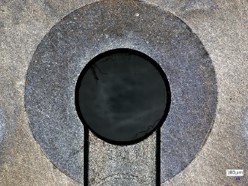DGMK-Project Automotive Fuels
Examination and evaluation of the content of polar species in diesel fuels with regard to their tendency to deposit formation
Chair for Piston Machines and Internal Combustion Engines
Faculty of Mechanical Engineering and Marine Technology,
Dr. Ulrike Schümann, Dr. Fanny Langschwager
Many performance characteristics of fuels, such as lubricity, compatibility with seal materials/seal swelling, storage stability, thermal stability and tendency to form deposits on injection components are largely determined by trace levels of polar species (oxigenates/nitrogen components). Since the polar fraction comprises only a small part of the fuel matrix, it is difficult to determine these components directly by GC-MS without first removing the fuel matrix from non-polar components (alkanes, naphthenes, aromatics). This can be done, for example, by a combination of liquid-liquid extraction with methanol followed by an isolation step using high-performance liquid chromatography. Individual components can then be identified by GC-MS. The extent to which this procedure is also applicable to DK-FAME blends needs to be investigated. From the FVV project "Kraftstoffveränderungen II" (Fuel Changes II), extensive investigations on the tendency to deposit are available from laboratory tests with different diesel fuels, which are substantiated by component tests on the injection test bench.
The diesel fuels from the FVV project "Kraftstoffveränderungen II", which have already been well characterised with regard to their deposition tendency, are to be investigated for the content of polar components. Chemical changes of the polar components in these diesel fuels due to thermal stress will also be analysed both in samples from existing or new ageing tests (e.g. JFTOT) and in leakage fuel samples from the injection test bench and, if necessary, particularly reactive compounds with a high tendency to deposit will be identified.
On the basis of these results, it is to be examined whether the content of polar components can be correlated with the already determined tendency of deposition on injection components. Possibly, a parameter "content of polar components" can be derived from this, with which the tendency to form internal deposits in injectors can be evaluated.
The project has been completed. The DGMK research report 783 was published.

Dr. Martin Müller
Chairman
ERC Additive GmbH
Buchholz
Jan Ludzay
Head of the Refining and Product Application Department

IGF - Industrial Community Funding
Federal Ministry for Economic Affairs and Energy (BMWi)